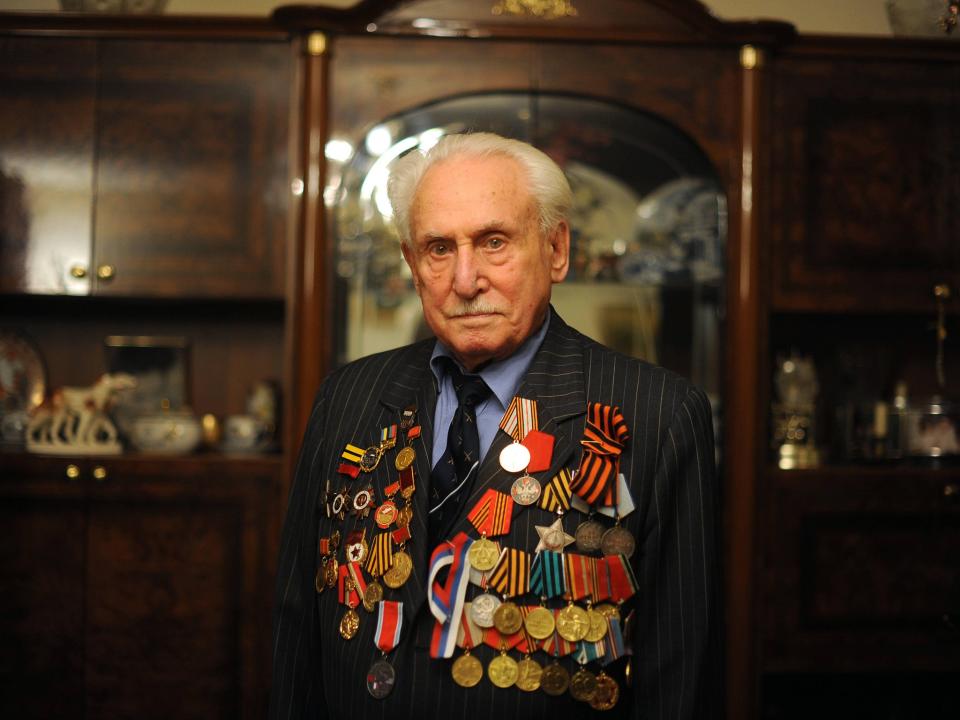David Dushman: One of the last surviving liberators of Auschwitz

David Dushman was a former Red Army soldier who played a key role in the liberation of the Auschwitz-Birkenau concentration camp, having driven his tank to break down the electric fence surrounding the complex.
Dushman, who has died in Munich aged 98, was one of the last survivors of the historic moment when the camp was liberated, allowing its remaining prisoners to be rescued and the investigation into its horrors to begin. He later went on to become one of the best Olympic-standard swordsmen of his era.
David Aleksandrovich Dushman was born in Danzig (Gdansk) in 1923. His father, a doctor, was a victim of Stalin’s great purge of 1938. At the outbreak of war, he joined the Red Army as a volunteer tank driver.
The war-weary soldier had already faced the battles of Stalingrad, in 1942-43, and Kursk, in July-August 1943. On 27 January 1945, he was part of a battalion of T-34 tanks that were heading westward towards Berlin when they encountered Auschwitz-Birkenau. Using his tank to flatten the electric fence, he enabled the rescue of the surviving prisoners.
Dushman recalled in an interview last year: “When we arrived, we saw the fence and these unfortunate people; we broke through the fence with our tanks. We gave food to the prisoners and continued. They were standing there, all of them in [prisoner] uniforms, only eyes, only eyes, very narrow – that was very terrible, very terrible.”
Following the actions of his battalion, ground troops were able to enter the camp and rescue some 7,000 survivors. However, Dushman and his comrades had no prior knowledge of Auschwitz or the atrocities being perpetrated there. Having taken what is now regarded as historic action, he and his battalion continued their journey towards Berlin on their quest to “hunt the fascists”.
It was not until after the end of the war that he was able fully to understand the scale of what had happened: more than a million people had been removed from their home countries and murdered by the Nazis in the Auschwitz-Birkenau concentration camp.
Holocaust Memorial Day now takes place annually on 27 January, the anniversary of the liberation of Auschwitz. Only Dushman’s contemporary and compatriot, Ivan Martynushkin, now remains as the last living witness to those events that took place more than 76 years ago.

Life in the Red Army tank division was for most soldiers short and brutal. Out of 12,000 men who travelled west through the German-occupied territories, Dushman was one of only 69 to return home alive, although he was seriously wounded three times.
Following the war he studied medicine, qualifying as a doctor, yet continued to pursue a passion for the sport of fencing, which he had taken up in his youth. By 1951 he was the top fencer in the Soviet Union. Recognition came the following year, when he was appointed the country’s fencing coach, training the women’s team for more than three decades until 1988.
At his peak he coached the team to take two golds, two silvers and three bronze medals at the Munich Olympics in 1972. At Munich, Dushman bore witness to the horrific terrorist attack which resulted in the deaths of 11 Israelis, five Palestinians and a German policeman. “He was an amazing man,” said Valentina Sidorova, a former pupil who competed in the Olympic team foil event, winning gold in 1976 and silver in 1980.
Following a spell living in Austria during the early 1990s, Dushman moved to Munich with his wife Zoja in 1996, continuing as a fencing coach. His passion for the sport remained, and until the age of 94 he was involved with teaching at local fencing clubs and visiting schools to educate pupils about the war and the Holocaust.
Invited to visit the International Olympic Committee (IOC) headquarters in 2015, Dushman spoke of his aspirations for sport as a way to bring people together and promote peace. “My biggest dream and hope for future generations is to live in a world where there is no war,” he said. “I urge [committee president] Thomas Bach and the IOC to do everything they can to use sport as a way to spread peace and reconciliation around the world. War is something that should never happen again.”
Bach, also a fencing gold medalist, said in tribute: “The death of David Dushman has deeply saddened me. When we met in 1970, he immediately offered me friendship and counsel, despite Mr Dushman’s personal experience with the Second World War and Auschwitz and being a man of Jewish origin. This was such a deep human gesture that I will never, ever forget it.”
His wife Zoja (nee Petrova) died in 2011, and their only son Sergei in 2017.
David Dushman, soldier and fencing coach, born 1 April 1923, died 5 June 2021
Read More
Eva Kor: Auschwitz survivor who suffered medical experiments under Mengele

 Yahoo Sport
Yahoo Sport 





































